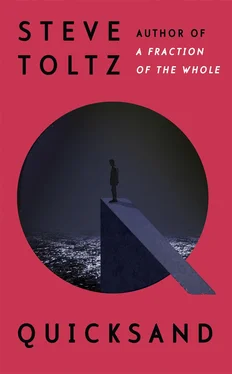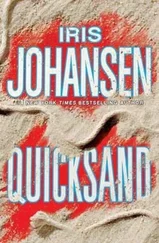Sometimes I’d swing by hoping to catch sight of Leila. She was an elegant, voluptuous woman, usually to be found smoking a cigarette and drinking from a bottle of beer, her skin silvered in the moonlight, and even from a distance I could feel her hot nakedness under that dress, this lady from the vanished Pacific island Aldo wouldn’t name. My fascination was not entirely sexual. She valued my opinions, often told me I thought for myself, and was just as delighted that I hated the sound of Nina Simone’s voice as she was by my pronouncement that The Sun Also Rises is a stupid name for a book.
Now, in the wake of the rape accusation, this exposed apartment was the worst possible place to live; car engines revved at late hours and misspelled death threats tied to stones were pelted through windows. When I arrived one afternoon they were sitting in the kitchen; his head was buried in his arms on the table and Leila sat leggily on a stool with a legal pad, pen poised. ‘What do you think, Liam? Should I speak to the girl’s mother?’
What an idea.
‘I don’t think so.’
‘Poor girl. Still. We’re in a tough spot, we must be careful not to be too aggressive.’ She put down the pen and said, ‘I’ll ask Father Andrew. He knows some lawyers.’
Aldo lifted his head. ‘I’ll bet he does.’
Leila ignored him and said, ‘Liam, did your parents ever tell you that part of being a grown-up is having the ability to assess risk?’
‘Not that I recall.’ The idea of my parents saying anything remotely resembling that was laughable. Leila swivelled around to zap me with a disapproving gaze. ‘What made you throw a party like that ?!’
Aldo hit his head on the table repeatedly. I looked away to the bunches of lilies by the sink, bulbs and dirt still attached, maybe pulled from a neighbour’s flowerbed, and to a pile of books we were force-read in English class— Catch-22, Pride and Prejudice, The Caretaker —and a thick blue faux-leather edition of Bulfinch’s Mythology , Aldo’s old obsession.
‘Darling,’ Leila said, stroking Aldo’s hair, ‘this whole disaster makes me think of “The Black Riders”. By César Vallejo.’
‘Mum, don’t even start.’
Leila cleared her throat. ‘There are blows in life so violent — don’t ask me!/Blows as if from the hatred of God; as if before them,/the deep waters of everything lived through/were backed up in the soul … Don’t ask me!’
‘Nobody’s asking you.’
‘Well, I’m asking you. How could they think you could do such a thing? Why did you have to leave the house that night at all?’
Aldo raised his head again. ‘Maybe we should move far away. Into the country.’
‘The country can be summed up in one image,’ Leila said. ‘A horse’s eyes covered in flies. God has thoroughly let that animal down. It can’t swat away shit.’ She reached across and tugged Aldo’s earlobe, a gesture that had no evident purpose or effect. ‘No, I love this apartment,’ she said. ‘I fully intend to die here.’ She glanced at Aldo and added, ‘Don’t look so excited. That won’t be for a very, very long time.’
‘Don’t be so sure. Matricide’s making a comeback.’
They both giggled.
I couldn’t figure out what they meant by talking to each other like that. It used to stump me — my parents and I were painfully cordial and seemed to have based our relationship on a model that served families well in the Habsburg Empire, while Aldo and Leila layered theirs with a constant casual cruelty. A few months earlier he had given her a birthday card in which he’d drawn a picture of God in heaven sodomised by the hillbilly dead, with the words I love you incrementally less each day , and for his birthday she gave him one that said Happy Birthday, you son of a bitch . I might have envied their relationship, but I never understood it.
‘I’m going to the loo, then let’s go,’ Aldo said to me.
As soon as he left the room, she said, ‘You need to look out for him.’
‘I’ll do my best, Leila.’
Her eyes went to the window, where neighbourhood girls hopscotched by. Maybe closed blinds made her feel claustrophobic (though I couldn’t see how being hemmed in by foot traffic was any great improvement). Then Leila launched into a monologue about the inexplicable shambles Aldo’s life had suddenly become, lamenting that this could be the ruination of her harmless, unimpeachable little boy. As she spoke, I was reminded of her voice-over work (her smoky tones narrated a commercial that pitted margarine against something called ButterSoft). Leila stubbed out her cigarette after four drags, and interrupted herself with questions to me — would you like cake or cheese? Do you want to stay in the kitchen or should we adjourn to the living room? — then snapped her fingers. ‘Find the real rapist — to prove his innocence we must unmask the real culprit. If this is not nipped in the bud …’ This was fear talking, and fear can be verbose. She wanted constant reassurance while being totally resistant to any emotional comfort. ‘I thought the something bad that would happen to Aldo would be leukaemia, but I was off, way off.’
Clearing my throat was all I could think to do. An awkward silence descended. Leila had miraculously run out of things to say. My eyes explored the wall behind her head where, partially obscured by the long fronds of a spider plant, there was an old framed photograph of Henry, Veronica, Leila and Aldo. They were standing in a yard with arms draped over each other’s shoulders, tight little smiles and unbearably sad eyes — the kind of photo that rouses a memory even if you’re not in it. Veronica’s skin was marginally darker than Aldo’s, more like her mother’s, while Leila and Aldo, the last two surviving soldiers of a unit that had taken heavy artillery, looked vaguely restless, it seemed to me, as if they wanted to wander off into another photo altogether. Directly above that on the wall was a framed quote: Blessed are they that mourn: for they shall be comforted.
‘What’s your favourite biblical passage?’ asked Leila, catching my interest in the quote.
Did she really think I would have one?
‘The Ten Commandments?’
‘Oh dear, Liam. Really? Moses did his best I’m sure,’ she said, ‘but at least Matthew didn’t try to get the Sermon on the Mount down in point form .’ I wondered if she was a little drunk. ‘And this is certainly the right time to point it out to you — the Ten Commandments is a horrendous document made horrendous by the sin of omission. Where the fucking hell is Thou Shalt Not Rape?’
She had a point.
Her long fingers with their mauve nail polish seized my wrist. ‘Please keep an eye out.’
‘For what?’
‘His father, Henry, didn’t take well to stress, as you might know. They say these things are genetic, although I don’t see how. How can a choice made in adulthood be genetic?’ The silence grew broody. I understood now. She was talking about suicide. Every speechless second burned a hole right through me.
Aldo appeared in the doorway.
‘Aldo!’ she yelled at him. ‘I almost forgot. Listen to this.’
She ran to the answering machine and played a message. ‘Leila, it’s Hannah, we’ve just heard about Aldo and we’re sick about it. Please call.’
‘How did they hear about it?’ Aldo asked.
‘Who the fuck knows?’
‘Who’s that?’ I asked.
‘Ech. The Benjamins ,’ Leila said, darting glances at the window before turning to me. ‘They’re a sort of tribe of monumentally rude shits, the kind of people who get kicked off ashrams. Well, some of them did. They’re always mocking and urging each other to do something awful, and remember this one, Aldo?’ She told a story about visiting Henry’s cousin Miguel at his Umina beach house: he’d been arrested for assault and was forced to wear a home-detention cuff on his ankle; his range ran out three metres from the ocean, and they’d spent the summer taunting the poor bastard with ice-cold splashes of seawater.
Читать дальше











